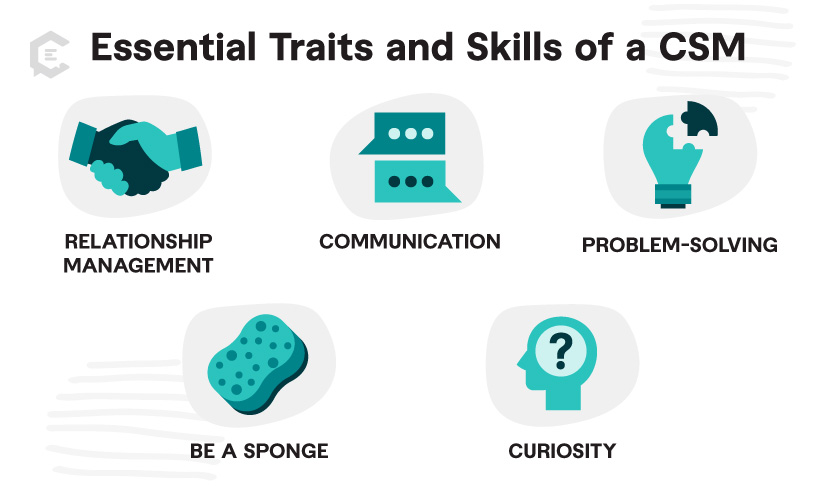In the digital era, products and services range from the tangible to the intangible. The line between objective and subjective products has blurred.
Subjective products rely heavily on an individual’s perception, making them more elusive when measuring their efficacy and value. That can present unique challenges for businesses in content marketing and similar industries.
Enter the Customer Success Manager (CSM). This comprehensive article will cover the essential skills that make a successful CSM and their unique challenges with subjective products. Then we’ll tackle common pitfalls and actionable strategies and tips.
Let’s get started.

Understanding the Role of a CSM
Customer Success Managers are the point person for customers once they’re through the sales phase and into the support phase. They directly help the customer grow and achieve their goals while strengthening the relationship with their company. Some key CSM responsibilities include:
- Building a “positive experience and healthy working” relationship with customers
- Advocating for customers internally
- Enabling internal departments to greater success
Why a CSM is Critical in Content Marketing
Establishing a connection with your customer is the cornerstone of any effective content marketing strategy. Your CSM is essential in building and retaining that connection.
A great CSM:
- Addresses problems or concerns with content quality, production timelines, and content amplification
- Gains a unique understanding of what a customer needs and how they operate
- Knows when a specific content type or topic is more impactful for certain audiences
They are your customers’ guide, ensuring everything runs smoothly after a purchase. If a customer has any problems or concerns, the CSM works with them directly to resolve any issues.
They’re also critical to the company itself because they are, in essence, the voice of the customer. In dealing with the customer directly over a long period of time, they gain a unique understanding of what that customer needs and how they operate. That makes them extremely valuable in creating a lasting connection with the customer and retaining them long-term for your business.
With such an important set of responsibilities, a CSM must have a foundation of specific skills to be successful.

Essential Traits and Skills of a CSM
The role of a CSM requires a unique skill set. Here are the essential characteristics all the best CSMs have:
Relationship Management
Customer success managers are the go-between for a company and their customers. They advocate on behalf of the company as to why they can help customers achieve success and explain how their business can meet a customer’s specific needs. They’re also essential to nurturing positive customer relationships, being the customer’s direct point of contact.
That critical role is like a quarterback in football. They’re on the field with the customers getting ground-level feedback and then relating it to the organization. The best CSMs manage the balance of these relationships by being a leader on and off “the field.”
Communication
With that management comes communication. A great CSM is a proactive communicator. They take the initiative to guide the business and the customer toward success. They’re also skilled interpreters. They can interpret customer needs into actionable strategies that achieve their goals.
They also know how to translate those needs into the proper language to communicate to their business and vice versa. Also, you can’t employ a “one-size-fits-all approach with subjective products.” Not every customer needs the same thing. And not every customer communicates the same way. You must take each customer individually and know how to tailor your communication to them specifically.
Problem-Solving
With any business and relationship, roadblocks come up. And in the world of subjective products, a CSM needs to be agile and responsive to challenges as they happen in real-time. A proactive problem-solving approach is crucial. But it’s not just about identifying and rectifying issues. It’s also about anticipating potential hurdles and crafting contingency plans to ensure clients feel safe and supported every step of the way. A great CSM has an “Adapt and Overcome” mentality and views challenges as opportunities to strengthen their bond with their client.
Be a Sponge
With the ever-changing landscape of content marketing, there’s always more to learn. As a CSM, you must try and learn as much as possible. Always be open to learning more skills and spending time talking to other departments. The more you understand other departments, the better you can communicate with them. That leads to a healthy inter-departmental collaboration that streamlines processes and offers enriched experiences to both the company and clients.
Also, don’t be afraid to ask tons of questions about your customer’s business. Immerse yourself in their world. Gaining a deeper understanding of them and their world gives you a greater chance at tailoring impactful solutions for their business.
Curiosity
Being a sponge means staying curious. Every interaction is a learning opportunity. Look for ways to increase optimization. Offer innovative ideas that may change how things are done.
This curiosity really comes into play when you’re brainstorming with customers. Don’t be afraid to reframe existing ideas to offer a fresh perspective. Collaborative ideation is a cornerstone of a lasting client relationship. If you read “The Challenger Sale,” salespeople who get the most significant deals are the ones that challenge the customers and how they think about certain solutions. By constructively challenging them and urging them to think more expansively, you position yourself as not just a service provider. You become a strategic partner.
Even with a great skill set, the best CSMs can run into challenges from time to time, especially with subjective products.

The Unique Challenges of CSMs for Subjective Products
Historically, in arenas like the Tech and SaaS space, CSMs are trying to get customers or users to use a particular product or service, like an app. At ClearVoice, a managed service company, CSMs aren’t necessarily trying to increase product usage. It’s more about driving content delivery and enabling customers to think differently about the full scale of content marketing. It’s also about growing partnerships to flourish past the first contract. Luckily, marketers make great customer success managers.
With that subjectivity comes its own unique set of challenges. Here are some pitfalls to avoid:
Lack of Operational Support
With subjective products, CSMs have a variety of roles. They have to be account managers, product advisors, and mediators. Managing all those “hats” can be challenging. That’s where a strong structure can really help.
That means putting more support behind the CSM role, like establishing CS operations. CS Ops, essentially, treats CSMs as their customer. The goal is to enable CS to drive more value, be more efficient, and have the information they need to be successful. At its core, CS Ops is responsible for effecting change at a macro level. This allows Customer Success to operate effectively, reduce wasted efforts, and establish a strong structure for scalability. That structure:
- Helps optimize their processes
- Creates innovative improvements to their strategies
- Ties everything back to reliable data
Organizations without CS Ops can get by but eventually hit a threshold. Some aspects that may drive the need for CS Ops are:
- Total amount of accounts per CSM
- Total revenue managed per CSM
- Total number of CSMs within the organization
In having someone dedicated to overseeing the “function” of customer success, you can help tie CSMs to two of the most important business drivers: customer experience and revenue growth
Let’s use the Quarterback analogy from earlier. While individual CSMs (QBs) can call the shots, they are focused on one play at a time (or one customer at a time). You also want someone that can break down the overall playbook, the defense, the specific players…etc. Think of the CS Ops Manager as the Offensive Coordinator.

Actionable CSM Strategies to Ensure Customer Success and Satisfaction
Customer success management with subjective products is a dynamic landscape that’s constantly evolving. It requires strategies that align with business objectives and resonate with clients’ perceptions and expectations. Here are some core strategies and measurements that guarantee success and satisfaction.
Strategies and Measuring Success
Time to Value
In the world of subjective products, time to value is a great metric to track vs actual performance metrics. Content marketing is a fast-paced world where speed is of the essence. But it’s not just about speed; it’s also about the value derived in that time frame. Getting customers their deliverables promptly allows them to publish or distribute content or creative assets quickly, creating immediate value. That has a lot of benefits, such as:
- Client Perception: Quick turnarounds foster a perception of efficiency and dedication. The quicker you move, the more you display how closely you work with them and get their stuff out there.
- Competitive Edge: Rapid delivery is a great way to set you apart in an oversaturated market where any edge you can get is precious.
- Immediate ROI: For a client, the faster they can deploy assets, the quicker they see returns.
- Trust and Confidence: Time to Value also increases when customers can truly rely on not only the business they partner with but the CSM as well.
Customer Satisfaction
Customer satisfaction might be the most subjective yet critical metric. It’s an amalgamation of factors that range from communication to product efficacy. Regular check-ins with your client is a simple way to continue growing your relationship with them and ensure they’re happy and content with you and your company. Feedback surveys are also a great way to solicit feedback to gauge clients’ satisfaction levels.
Retention
A successful CSM not only attracts clients, it also ensures they stick around. For your retention strategy, here are a few things to think about:
- Renewals: If you want to keep clients onboard, you have to be proactive. Approach clients before a contract ends and offer them renewal options. You can also highlight new features or services that might interest them.
- Churn Management: With any company dealing with customers, they’re always a degree of “churn” or clients leaving. It’s essential to understand why so you can make adjustments. Conduct exit interviews or surveys to get feedback and pinpoint areas of improvement. Addressing these issues preemptively counteracts potential churn in the future.
- Account Growth: One of the best validations of your services is when a client chooses to expand their account. Always regularly apprise clients of additional services or products they might benefit from to create opportunities for account growth.
CS Case Study
CX Initiative
At ClearVoice, we wanted to take a deeper look into the satisfaction of our customers to understand how to provide more value. So recently, we conducted a comprehensive initiative in leveraging the CSAT (Customer Satisfaction) methodology. In most cases, CSAT is measured through surveys, but ClearVoice chose a direct approach instead. CSMs met with their customers on the phone and asked them directly about their level of satisfaction. They focused on three CSAT Outcomes:
- Satisfied
- Somewhat Satisfied
- Not Satisfied
That objective feedback told the CSMs what they needed to do for each individual client. The main goals were to drive retention, initiate growth conversations, and mitigate early-stage churn. That initiative led to upcoming renewals of over $600,000 plus over $200,000 in revenue saved.
“Zero to Hero”
This case study is a great example of how a CSM can save a client relationship and mitigate churn. At ClearVoice, a cloud-based document management company wanted to cancel its $100,000 yearly contract due to quality concerns and internal issues. So, ClearVoice reshuffled the team, connected a new CSM to the account, and spent considerable time understanding their honest feedback and satisfaction.
The new CSM built a strict action plan to address the company’s concerns and achieve its initial goals through dedicated attention, support, and focusing on the time to value with regards to conflict resolution. That plan quickly turned the account around that they renewed and upped their deal for $100,000 over two months vs. one full year. That renewal stemmed from the customer valuing their newfound CSM’s opinion greatly that they actually looped them into their internal strategy conversations for new content ideas.

The Future of CSMs in Subjective Products
Becoming Hybrids
As the landscape shifts, there’s a high chance that CSMs will become a hybrid of account managers and product advisors.
In most industries, a customer success manager focuses on driving product usage. With subjective products, CSMs have a hybrid role combining driving success with account management. They take on the mantle of account managers, growing and retaining the account.
Also, while departments like Sales focus on attracting and closing new business, CSMs act like Account Managers by driving renewals and growth to current business. That puts them in a unique position that could lead to an evolution where they have an increased responsibility in retaining, expanding, and saving accounts.
Leveraging AI
Ai is revolutionizing industries everywhere, including content marketing. AI won’t take over the CSM role, but it could be incredibly supportive. AI can empower and enable CSs to do exponentially more things and be more effective. Programs like ChatGPT or Claude can generate ideas on how to upsell customers within specific industries, verticals, or products. AI can be used for creative ideation and business research to gain more knowledge, and thus, enabling CSMs to speak their customer’s language better.
Customer Success Operations
CSMs deal with the day-to-day for accounts. Having someone in place who can look at how things run and optimize them can increase opportunities for CSMs and set them up for higher success.
They can also tie back CSM efforts related to revenue and help sales by closing more deals. Putting someone in a role overseeing operations, especially with the possible CSM hybrid evolution, increases efficiency and optimizes how revenue comes in with current customers.
Customer Success Manager Next Steps
In the ever-evolving world of content marketing, success hinges on how you navigate the journey alongside your customers. And the customer success manager is the critical key that unlocks unlimited potential in that relationship. But it’s not without its challenges as well.
If you’re struggling to navigate that journey, we’re here to help. Our managed content creation team equips you with the tools and expertise to elevate your content strategy to the next level. Talk to one of our specialists today.



